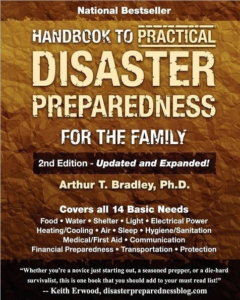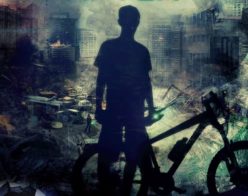“Handbook to Practical Disaster Preparedness for the Family, 2nd Edition” is one of the best disaster preparedness books on the market and I interviewed the author, Dr. Arthur Bradley. He generously agreed to answer some questions I think we all care about, for example:
- What is the most important aspect of disaster preparedness?
- What is the easiest thing I can do to be better prepared for disaster?
- What is the least expensive thing I can do to be better prepared for disaster?
These and other interesting practical prepping questions and answers await you below. Enjoy!
Dr. Bradley, if there was a single, simple preparedness message you wanted people to understand, what would it be?
My message would be to keep your preparations simple and effective. Avoid getting caught up in hype or paranoia. Start with a simple threat assessment, identifying the disasters that you are most worried about. This assessment might be drive by likelihood, severity, or special vulnerabilities. Once you have identified the threats that are of greatest concern, determined their impacts (e.g., food shortages, loss of electricity, lack of medical care, etc.). With the impacts clearly understood, it then becomes possible to take steps to mitigate their effect on your family. For example, if you’re worried about losing electrical power during a hurricane, then equipping your home with a backup system (such as a generator or battery/inverter system) would be near the top of your list of preparations. By working through this logical process of threat assessment, impact identification, and targeted preparations, you can effectively prepare your family for a wide range of disasters.
What inspired you to write your books?

I’ve always been interested in disaster preparedness and wilderness survival. When I was a child, my father was a big survival advocate. I remember sitting around as a family studying maps of probable nuclear blast zones and discussing where we would retreat to. What really drove me to action, however, were the terrorist attacks of 9/11. As I watched the Twin Towers burn, I decided that my family was terribly underprepared for the kinds of dangers that we might face. This led down a long road of reading every book on the market, taking appropriate training, assessing my own family’s needs and preparations, and then taking concrete steps to get ready. It also motivated me to put my research together into a handbook that I hope others will find useful.
What is the most important aspect of disaster preparedness?
The most important aspect is to consider the needs of your entire family. Too many people forget about their family’s special needs, whether they are the needs of children, pets, an elderly parent, or someone with a medical condition. A disaster preparedness plan should be tailored to each family. A family with five kids that lives in rural Nebraska is very different than a retired couple living in a high rise apartment in downtown Los Angeles. There is no one right answer that fits everyone.
How can I explain to my wife, husband, parents, kids, or friends why disaster preparedness is important? What is the easiest way to give information to others without sounding crazy, “doom & gloom”, or paranoid?
I find that it’s easier than most people think to invite others to join the cause. The hard fact is that we all want to survive. When people see a viable threat, they pay attention. A clear, level-headed proposition to get better prepared is usually met with some understanding. Nearly all of us have been affected (or know someone affected) by widespread disasters. That often serves as a good jumping off point for forming a disaster preparedness network.
I personally think that there’s a movement underway in the US (and perhaps globally) to get better prepared. It’s likely due to the unprecedented number of disasters that occurred in 2011. Consider that in 2011, there was over 265 billion dollars worth of damages globally! Just within the US, there were nine disasters that caused at least 1 billion dollars of damage, not to mention the horrific loss of life from tornadoes.
What is the easiest thing I can do to be better prepared?
I tell people to start by storing 30 days of food and 14 days of water. Next would be to set up a backup heating system (if appropriate to the climate). These simple steps can help families get through many commonplace disasters.
What is the least expensive thing I can do to be better prepared?
Simply to start paying attention. My motto is Stay Alert = Stay Alive! Getting a weather radio is a good example of a paying closer attention to the threats around you.
What is the most important training I can get for disaster preparedness?
I’d start with first aid training. Everyone should know life-saving first aid, whether it be how to stop bleeding, recognize the symptoms of a stroke, or administer CPR. CERT training, firearms instruction, and HAM radio licensing are also valuable.
Concerning disaster preparedness, what is our biggest cultural weakness in the US?
Like many parts of the world, we’ve grown fat, dumb, and happy. Many people are complacent and live under an imaginary umbrella of protection that our government provides. I feel that we need to return to our roots and recognize our own responsibility for our family’s safety. More grit, less handouts.
What is our biggest infrastructure weakness in the US?
Arguably, it’s the electrical power infrastructure. The electrical grid serves as the lifeblood for nearly every other infrastructure (i.e., food harvesting and distribution, water processing and distribution, banking, transportation, telecommunications, petroleum and natural gas, emergency services, and government). If it goes down, everything else quickly fails. By all accounts the power grid is old and prone to systemic failure. Consider the widespread and lasting effects of a long term failure – such as from an EMP attack or solar storm.
What’s your next book about?
As you know, I currently have two books out. The Handbook to Practical Disaster Preparedness for the Family is a comprehensive book that helps individuals and families understand the process of getting better prepared. The newest book that I have out is Disaster Preparedness for EMP Attacks and Solar Storms. As the title would imply, it hopes to address these two very important threats by analyzing the likelihood and ramifications of the events. It also outlines how individuals can prepare and protect themselves from these dangers. My next book will likely be an Advanced Prepper’s Manual, discussing more advanced topics when preparing for truly world-changing events.
Can you tell us a little more about yourself, a quick bio?
Dr. Arthur Bradley is an Army veteran, father of four, martial arts expert, and dedicated homeschooler. He is active in volunteer youth organizations, including the Boy and Girl Scouts of America. He holds a doctorate in engineering from Auburn University and currently works as a senior engineer for NASA. Having lived all across the United States, Dr. Bradley writes from personal experience about preparing for a wide variety of disasters, including earthquakes, tornados, hurricanes, floods, house fires, and massive snowstorms. He prescribes to the philosophy that preparedness should always be motivated by love and concern, never by fear and paranoia. His practical approach to family preparedness has received widespread praise from individuals, emergency preparedness experts, and religious organizations.
Thanks for your time, and illuminating comments, Dr. Bradley!
-Andrew

Andrew – very good interview. Sounds like Dr. Bradley knows what he is talking about and while I have not read his books yet, I will certainly find them soon.
Thanks again for your important work
Bob
Thanks Bob. Yes, I think he’s a down-to-earch author with useful advice. I’m impressed with his books so far.
-Andrew
I’ve been seeing preparedness info for EMP attacks and solar storms popping up more and more. Thanks for this interview, I’ll be looking into those topics.